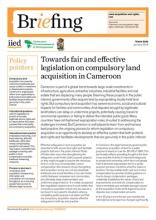Land Library
Welcome to the Land Portal Library. Explore our vast collection of open-access resources (over 74,000) including reports, journal articles, research papers, peer-reviewed publications, legal documents, videos and much more.
/ library resources
Showing items 1 through 9 of 67.Our new feature film from Roy Maconachie and Simon Wharf explores the pathway of a diamond from mine to market, and asks the question, who really benefits?
OpenCommunityContracts.org is a repository of publicly available community-investor or community-government contracts and agreements relating to agriculture, forestry, mining, oil and gas extraction and other natural resource projects.
Cameroon is part of a global trend towards large-scale investments in infrastructure, agriculture, extractive industries, industrial facilities and real estate that are displacing many people.
Over the last decade, there have been considerable concerns raised regarding the social and environmental impacts of large-scale land concessions for plantation development in various parts of the world, especially in the tropics, including in Laos and Cambodia.
WEBSITE ABSTRACT: This case study presents a country-wide quantitative analysis of a Parliamentary Commission established in 2012 in Myanmar to examine ‘land grab’ cases considered and to propose solutions towards releasing the land to its original owners, in most cases smallholder farming famili
This paper focuses on one community in Cambodia that won back land from a large land deal by grabbing onto the rupture in property relations initiated by a one-year land titling campaign.
This article focuses on how climate change mitigation policies and economic land and mining concessions in Prey Lang, Cambodia, accommodate and facilitate each other physically, discursively and economically.
ABSTRACTED FROM CHAPTER INTRODUCTION: The preceding chapters of this book give a central place to the Powers of Exclusion framework for understanding transformations in land relations, as developed in our 2011 book on Southeast Asia.
Since small-scale farmers manage most of the cultivated land worldwide, the ongoing shift in systems of production associated with large-scale land acquisitions (LSLAs) may dramatically reshape the world's agrarian landscape, significantly impacting rural populations and their livelihoods.



